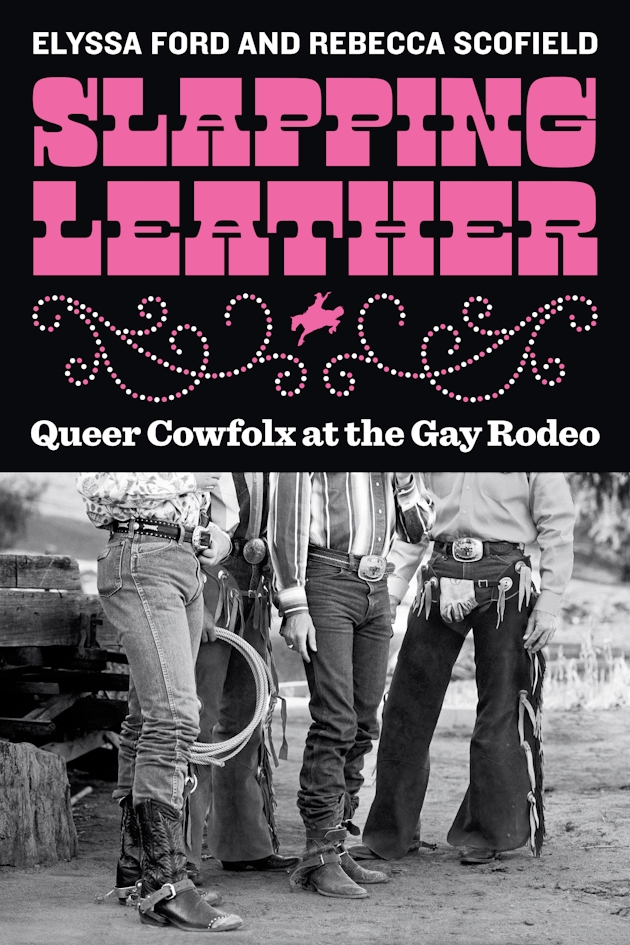Elyssa Ford and Rebecca Scofield
Slapping Leather follows the development of gay rodeo from its origins in the 1970s into the present day. The book examines the meteoric rise of this queer riding circuit during the country-western heyday in the 1970s and 80s, its dramatic evolution during the HIV/AIDS crisis, and the more recent decline gay rodeo has seen with its members, rodeo participants, and fundraising efforts. Through gay rodeo we can learn more about the LGBTQ+ movement for rights and, specifically, how the movement was not just urban and liberal but intersected with suburban, rural, and conservative people and identities.

NOTCHES: What drew you to this topic, and what questions do you still have?
Elyssa Ford and Rebecca Scofield: Both of us included a chapter on gay rodeo in our first books (Rebecca Scofield, Outriders, 2019 and Elyssa Ford, Rodeo as Refuge, Rodeo as Rebellion, 2020), and we were eager to explore it further for our next manuscript. Rather than pursuing separate projects, we joined together to co-author Slapping Leather. We closed the story of gay rodeo just at the end of the COVID-19 pandemic, but we both have questions about how gay rodeo will emerge from those years of restriction and limited movement. There also are some really interesting accounts of opposition to gay rodeo that came from LGBTQ+ organizations, so there definitely is more to investigate there. And, of course, there are many more state and regional stories to tell about the rise and fall of the various member associations.
NOTCHES: This book engages with histories of sex and sexuality, but what other themes does it speak to?
EF/RS: Our book addresses issues like the perceived political divide between rural and urban spaces, the importance of neoliberal rhetoric in supposedly apolitical organizations, the consequences of the rise of the religious right, and the importance of grassroots civic organizing and fundraising for marginalized communities.
NOTCHES: How did you research the book?
EF/RS: The Autry Museum of the American West houses the archives from the International Gay Rodeo Association, and we were able to make a series of visits to Los Angeles to look closely at those materials. IGRA itself has done an impressive job of documenting and digitizing its materials, available on www.gayrodeohistory.org. There also are smaller gay rodeo collections at the USC-ONE Archives in Los Angeles and the University of Nevada-Reno. We are both in awe of the devotion that it took for IGRA members to gather, save, and donate their materials, and we are so thankful to have had access to it. The rodeo programs with their images for gay bars, HIV/AIDS announcements, and memorial statements honoring members who have died were particularly revealing because they shine a light on the queer community at specific moments. The association newsletters were also important because here is where the work of gay rodeo was revealed in a less public way than the rodeo programs, which were carefully curated for a public audience.
NOTCHES: Whose stories or what topics were left out of your book and why? What would you include had you been able to?
EF/RS: We are delighted that the press permitted us to include as many images as we did, but we can easily say we wish we could have included even more, especially images from the rodeo programs – and images in color! We do our best to describe the images, but some of them are just so much more impactful in full color.
NOTCHES: Did the book shift significantly from the time you first conceptualized it?
EF/RS: Because we already had worked on gay rodeo and were familiar with the archival material, we pretty quickly outlined the topics and chapters. We stayed pretty true to that over the course of our work.
NOTCHES: How did you become interested in the history of sexuality?
EF/RS: As scholars of identity and the twentieth century, sexuality has been a core nexus around which people have shaped their everyday lives, fought for change, and forged community. We both found that this central pillar of identity was crucial for understanding both how white settler-colonialism played out in the lived experience of westerners and how people conceptualized the cowboy as a popular culture icon over the twentieth century.
NOTCHES: How do you see your book being most effectively used in the classroom? What would you assign it with?
EF/RS: Because of the digital resources available on www.gayrodeohistory.org, this book can very nicely be paired with primary source materials including rodeo programs and association newsletters. This allows students to gain an overview of topics, such as camp events and the royalty contest or HIV/AIDS fundraising, and then be able to explore it for themselves in the primary sources. Slapping Leather would fit into classes on modern and contemporary American, gender and sexuality, sport studies, and the American West.
NOTCHES: Why does this history matter today?
EF/RS: As our country is becoming more politically divided and attacks on LGBTQ+ people are increasing, especially in rural red states, Slapping Leather demonstrates that queer people have been in rural spaces and participating in country-western culture since the beginning. Gay rodeo also vexes the assumptions about red rurality and blue urbanity as we illustrate the wide variety of people who found family on the rodeo circuit.
NOTCHES: Your book is published; what next?
Elyssa Ford: I am working on an edited collection titled Women on the Edge. Through ten sets of paired chapters, this collection considers the experience of women in extreme sports, past and present in the United States. For instance, it was seen as physically dangerous and sexually risque (aka extreme!) for women to ride bicycles at the turn of the 19th century. For the modern-day extreme sport on wheels, a chapter will look not at bicycling but at the rough-and-tumble sport of roller derby. I also am in the early stages of a project examining state welcome centers across the US.
Rebecca Scofield: I am working on a book titled Astride the Beast: Women Riding Horses, Dragons, and Everything In Between. From rodeo cowgirls to Daenerys Targaryen, the dangerous allure of a woman harnessing the power of a beast—whether animal or machine—as she sat astride its back both drove and assuaged central cultural fears about feminism, race, domination, and sexuality over the past century. Drawing from newspaper articles, memoirs, photographs, advertisements, romance novels, oral histories, science fiction, fanzines, pony stories, and more, Astride the Beast examines the history of this cultural image as it shifted between the 1890s and the 1990s.
 Elyssa Ford is an associate professor of history at Northwest Missouri State University, and her research centers on memory and identity, gender and sexuality, and public history education. Her first book Rodeo as Refuge, Rodeo as Rebellion (University Press of Kansas, 2020) examines gender, race, and identity in American rodeos. Slapping Leather: Queer Cowfolx at Gay Rodeo (University of Washington Press, 2023) is her second book. She has also written for the National Park Service, published on local history topics in the Missouri Historical Review and Middle West Review, and has written about academic-community partnerships and public history education.
Elyssa Ford is an associate professor of history at Northwest Missouri State University, and her research centers on memory and identity, gender and sexuality, and public history education. Her first book Rodeo as Refuge, Rodeo as Rebellion (University Press of Kansas, 2020) examines gender, race, and identity in American rodeos. Slapping Leather: Queer Cowfolx at Gay Rodeo (University of Washington Press, 2023) is her second book. She has also written for the National Park Service, published on local history topics in the Missouri Historical Review and Middle West Review, and has written about academic-community partnerships and public history education.
 Rebecca Scofield is an associate professor of American history and the chair of the department of history at the University of Idaho. She is the author of Outriders: Rodeo at the Fringes of the American West (University of Washington, 2019) and co-author of Slapping Leather: Queer Cowfolx at the Gay Rodeo (University of Washington 2023). She is the PI for the Gay Rodeo Oral History Project and co-creator of the web exhibit Voices of Gay Rodeo. She has also published on a variety of topics including stock shows, Idaho women’s history, and Dolly Parton’s body politics.
Rebecca Scofield is an associate professor of American history and the chair of the department of history at the University of Idaho. She is the author of Outriders: Rodeo at the Fringes of the American West (University of Washington, 2019) and co-author of Slapping Leather: Queer Cowfolx at the Gay Rodeo (University of Washington 2023). She is the PI for the Gay Rodeo Oral History Project and co-creator of the web exhibit Voices of Gay Rodeo. She has also published on a variety of topics including stock shows, Idaho women’s history, and Dolly Parton’s body politics.

NOTCHES: (re)marks on the history of sexuality is licensed under a Creative Commons Attribution-NonCommercial-NoDerivatives 4.0 International License.
Based on a work at www.notchesblog.com.
For permission to publish any NOTCHES post in whole or in part please contact the editors at NotchesBlog@gmail.com




